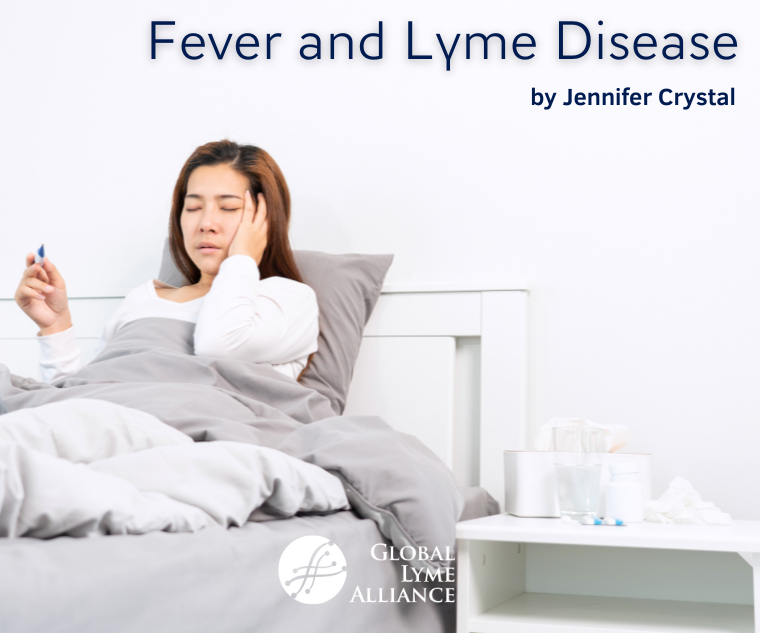
Discover the importance of recognizing and addressing low-grade fevers, especially in the context of tick-borne illnesses like Lyme disease. Learn why it's crucial to take fevers seriously and seek medical attention when needed.
You wake up feeling sluggish. Your cheeks are flushed. You have a mild headache. You reach for the thermometer and discover that your temperature is 99.5 F.
“That’s just a low-grade fever,” some well-meaning person tells you. “It might be your body’s normal temperature. It might be nothing.”
But you know your body’s normal temperature is below average—usually about 98.0—and that this 1.5-degree elevation isn’t nothing.
If this scenario sounds familiar, you’re not alone. For two years before I was accurately diagnosed with the tick-borne illnesses Lyme disease, babesiosis, and ehrlichiosis, I woke up most days with a low-grade fever. Usually, the fever would persist all day. Sometimes it would break for a couple hours, or I’d feel well for a couple days in a row, but then it would come back. I heard messages of, “well, it’s not high” or “that’s just what people get when they have a little cold.” Eventually, I started to believe them. I started to question my own experience and reality, telling myself to just ignore the symptom, to push through it.
Of course, I only felt worse. As other symptoms like joint pain, headaches, burning extremities, sleep disturbances, hives, and brain fog progressed, I finally made my way to a Lyme Literate Medical Doctor (LLMD) who accurately diagnosed me with tick-borne illnesses. I also found my way to a Lyme disease support group whose members told me, “A 99.5-degree fever may be low, but it still can make you feel awful.” That validation was almost as important to me as my diagnosis.
Fever is an indication that something is wrong in your body. Often, it is a sign of infection, especially as the temperature increases. Because my fever wasn’t very high, it was dismissed, but it was my body’s way of indicating that it wasn’t well. That it was fighting something, and doctors needed to determine what that something was. Fever is a common early symptom of Lyme disease, among other flu-like symptoms of swollen lymph nodes, fatigue, aches, and chills. Low-grade fever is also a common symptom of another virus I was fighting, chronic active Epstein-Barr virus following acute mononucleosis.
A rise in body temperature is part of the immune system’s response to infection, or a virus, or inflammation. Over-the-counter medication can temporarily reduce your fever and associated aches and pains, but to cure it, you have to figure out its cause. If your fever persists, even if it’s low-grade, it’s time to talk to a health professional about what’s going on.
If you’ve already been diagnosed with Lyme disease, know that a fever is normal as your body fights a serious infection. My fever came and went, especially if I was having a Herxheimer reaction. Eventually, it went away entirely as the load of Lyme bacteria decreased in my body. Now in remission for over a decade, I never get Lyme-related fevers. These days, if I do get a fever, it’s due to something acute like a sinus infection.
If you have a high fever, that could be a sign of a different tick-borne illness, so don’t just write it off as Lyme even after you’ve been diagnosed. Babesiosis, Colorado tick fever, and tularemia can cause high fever, while anaplasmosis, Heartland virus, and Southern Tick-Associated Rash Illness (STARI) can also cause fever. As its name would suggest, tick-borne relapsing fever is characterized by repeating bouts of fever lasting 2-9 days, alternating with periods of no fever. Be sure your LLMD has tested you for all tick-borne illnesses.
The bottom line: no matter the degree, fevers are real and can be serious, so you should take them seriously.
***

Jennifer Crystal
Writer
Opinions expressed by contributors are their own. Jennifer Crystal is a writer and educator in Boston. Her work has appeared in local and national publications including Harvard Health Publishing and The Boston Globe. As a GLA columnist for over six years, her work on GLA.org has received mention in publications such as The New Yorker, weatherchannel.com, CQ Researcher, and ProHealth.com. Jennifer is a patient advocate who has dealt with chronic illness, including Lyme and other tick-borne infections. Her memoir, One Tick Stopped the Clock, was published by Legacy Book Press in 2024. Ten percent of proceeds from the book will go to Global Lyme Alliance. Contact her via email below.
